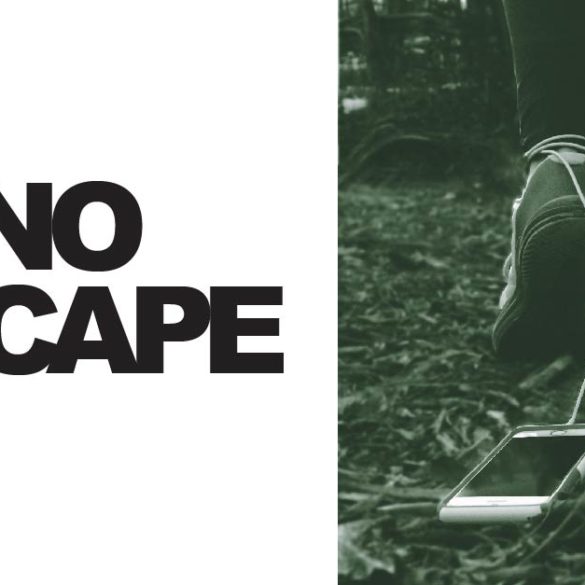Though Kasey Burchett would prefer living without modern technologies like her phone and social media, that doesn’t seem to be an option in modern society.
Kasey Burchett, a senior at Ball State University, lived in the jungle for three and a half months.
The experience in the summer of 2015 was part of a biology internship in Panama, which she shared with about 30 other students and directors she had never met.
Falling asleep in her hammock, a ceiling above and dirt floor below but no walls to keep out the night, Kasey would hear geckos calling. She walked barefoot during the day despite the cockroaches, spiders, and snakes. In Panama and on some other trips she has taken, she couldn’t access any form of technological communication.
Unlike many twenty-one-year-olds, Kasey would rather have it that way.
But she can’t. Kasey loves to travel the wild without the distraction of being online, but she also loves her family. She’d rather live Internet-free, but the web is the only thing bridging her juxtaposed desires to travel the world and stay close with people at home. So she needs to find a balance.
Widespread technology use stems largely from a desire to be connected and stay up to date on important issues, says Dr. David Shanley, a psychologist specializing in anxiety treatment. Anxiety might increase when the messages stop because people fear missing something about friends, family, or the world. But Shanley doesn’t think a screen can resolve that fear. Users end up missing out on what’s happening right in front of them, he says, which is exactly what Kasey is trying to avoid.
Kasey first realized her dream of traveling with a purpose when her high school senior class went to Nicaragua on a mission trip. As she created the foundations of a secondary school to replace the one-room building that served all the children in a community near Chinandega, she knew she wanted to work on sustainable development. This dream career would most likely happen in areas with little technology access.
She prefers learning “out in the wild,” through hands-on experiences she can’t get in a classroom at Ball State University, where she studies natural resources and environmental management. The first week of Kasey’s Panama internship frightened her, but she soon grew accustomed to sleeping in the jungle. Bushwhacking through the rainforest with a machete, she saw things she had never imagined: a blue leaf, a pink caterpillar that looked like cotton candy, and a mother tarantula with her baby.
The most difficult challenge for Kasey during her trip was spending so much time with people she didn’t know. But she started considering those strangers family after just one month and believes this would have taken much longer if they’d had access to Wi-Fi. When the technology is taken away, face-to-face human connection remains.
According to a Psychology Today article by Dr. Alex Lickerman, technology can also harm real relationships when used for easier confrontation because it doesn’t communicate emotion nearly as well as face-to-face interaction. The difficulty of confronting a problem in person, writes Lickerman, creates better opportunity for relational and personal growth.
Kasey understands the value of those opportunities and says living three months without cell service, television, or any contact with the outside world is easy and allows for the simplicity she loves.
She struggled to come back from a life like that.
According to Pew Research Center, 82 percent of adults say cell phone use in social settings frequently or occasionally hurts conversation. But 33 percent say it sometimes contributes to the group atmosphere, allowing people to record memories through photos or look up things to do together.
When Kasey doesn’t have Internet or phone access, her main challenge is staying in touch with relatives who live all around the country. A devotion to her family won’t let her disconnect.
Kasey returned to Panama on the last day of 2015 for a New Year’s Eve celebration with the same organization that arranged her internship. She spent most of the day in the valley that had been her home for more than three months, again without a phone signal.
She went to Panama City that evening, planning to just leave her belongings at the hotel and enjoy the New Year’s festivities. Before leaving the room, Kasey used the city’s Wi-Fi to check her phone for the first time all day.
She read the first text, from her mom’s cousin: “I’m so sorry about your Grandma.”
What’s happening? she thought. She then noticed the five missed calls and the other texts offering condolences. Something wasn’t right. She called her mom and learned that her grandma had passed away twenty-eight hours earlier. Kasey began crying in a room full of strangers.
Though Kasey enjoys the simplicity that comes with going offline, she now hesitates before traveling places where she won’t be connected.
“That made me realize that as much as I love traveling, my family is very important to me,” she says.
She is thankful for Skype, on which she relies to maintain several long-distance relationships. Such technology can be beautiful, she says, if reserved for important cases. She doesn’t believe anyone should “switch off” entirely, especially if they have a loving family back home.
According to the Pepperdine Journal of Communication Research, the use of Skype in long-distance relationships improves relational satisfaction. And approximately two-thirds of individuals on social media say that maintaining contact with friends and family is a main reason for using their accounts, according to Pew Research Center.
Do I want to follow my dreams or stay close to my mom? Kasey sometimes thinks when it seems like those two desires can’t coincide.
If she could, she would choose to live in nature all the time. But Kasey is trying to find a balance between what she wants to do and what she needs to do.
Occupational Psychologist Dr. Christine Grant says people must figure out how to use the Internet in a way that is compartmentalized and beneficial. They should develop an awareness of how technology affects them and use it to achieve their goals instead of letting it hold them back.
After graduation, Kasey would like to join World Wide Opportunities on Organic Farms in Australia for a few months. She then might do another six months with Conservation Corps, a service organization that sends young adults on months-long land management projects. She will hike the Pacific Crest Trail with her best friend in April 2018. Everything else is up in the air.
She has considered joining the Department of Natural Resources or Peace Corps before returning to graduate school to study fungi.
Though unsure of where she will end up, Kasey is fairly certain it will be out in nature, still struggling to find the balance between the life she wants and the life technology has created for her.





